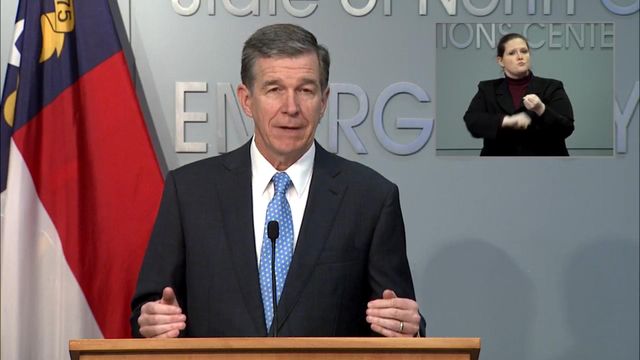Editorial: Cooper's budget speaks to N.C.'s needs. Legislators should listen
Friday, March 26, 2021 -- Policy and priorities are difficult. Math, addition and subtraction, is easy. What happens to the needs of North Carolina after there are more tax cuts and the emergency federal COVID-19 relief funds dry up that have kept schools functioning, fed families of the suddenly unemployed and provided health care for tens of thousands infirmed by the pandemic?
Posted — UpdatedThe contrast on priorities couldn’t be sharper.
Knowing that Gov. Roy Cooper would be unveiling his proposed budget the next day, the leaders of the General Assembly on Tuesday announced their top priority.
Legislative leaders’ criticism of Cooper’s budget seemed more based on fantasy than reality. “Thanks to a decade of predictable, responsible budgeting, North Carolina weathered the COVID-19 pandemic and recession without cutting state services or freezing teacher pay,” said state Sen. Brent Jackson, one of the legislature’s chief budget writers. Where’s he been?
North Carolina like the rest of the nation, weathered the great recession and (so far) the COVID-19 pandemic because of — first and foremost -- the sacrifice, charity and good faith of the people. But as it pertains to the government – particularly the state – it was the BILLIONS OF FEDERAL DOLLARS that continue to flood the state.
How would the state be paying for the extraordinary health care needs without federal funding? What would be the fate of North Carolina’s hundreds of thousands of suddenly unemployed be if they had to get by only on the state’s unemployment benefits (the lowest and shortest in duration in the nation)? Where would employers, farmers and business owners be – even as they have struggled – without the billions in federal emergency aid over the last 12 months?
We could go on, but you get it.
Policy and priorities are difficult. Math, addition and subtraction, is easy. What happens to the needs of North Carolina after there are more tax cuts and the emergency federal funds dry up that have kept schools functioning, fed families of the suddenly unemployed and provided health care for tens of thousands infirmed by the pandemic?
Critical needs will go unmet for lack of funding. If the priority is, regardless of needs, to cut taxes and reduce the size of government ignoring the obligations, that is the result.
While our legislative leaders may not like it, the people of North Carolina have set out specific expectations of what they want government to do. It is delineated in our State Constitution.
For a quarter of a century, our legislators have ignored the Constitutional mandate that it is the state’s obligation to provide every child with access to a quality education.
The legislative leadership’s answer is to criticize Cooper’s proposal to eliminate private school vouchers. These legislative leaders seem to believe their vouchers are the only route for “children to have an education that best prepares them for success.” Let us, again, be clear. We DO NOT oppose private school vouchers. But we are against the legislature’s program so lacking in accountability and transparency that it is an irresistible invitation to fraud and abuse. As currently run, there’s no way for any parent – much less the taxpayers who are footing the costs – to know if these students are learning a thing much less being prepared for success.
While some of the rhetoric coming from the legislature over Cooper’s budget plan has been confrontational, there are signs of willingness to listen and even attempt to find some areas of common ground.
“There’s been a meeting that both Sen. Berger and I attended with Gov. Cooper along with the House and Senate minority leaders to see where we could agree on things,” House Speaker Tim Moore said Thursday as that chamber was about to adjourn for the week. “Obviously there are some points of disagreement but there’s also a lot of shared agreement and shared priorities. So, I’m hopeful that that will lead to a good result this year as we move forward into the budgeting process.”
There should be little disagreement or debate on following a court’s accord to remedy the unconstitutional inequality in education. There’s certainly plenty of room for consensus.
Copyright 2024 by Capitol Broadcasting Company. All rights reserved. This material may not be published, broadcast, rewritten or redistributed.





